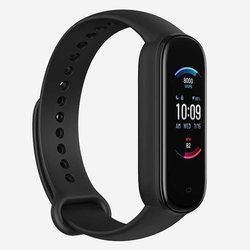
Amazfit Fitness Trackers
Amazfit is a Chinese wearable brand that offers health and fitness trackers and smartwatches like the Bip U, T-Rex, GTR 3, and the Band 5. These fitness trackers track it all--heart rate, sleep, blood oxygen levels, stress, steps, calories, menstrual cycles, and more. They also offer Alexa voice control, which means the little band on your wrist has microphones built-in. It's cheap and feature-packed. Should you trust it? Well, you phone also has a microphone built-in and you probably take it everywhere. Still, both feel just a little bit creepy, right?
What could happen if something goes wrong?
Amazfit doesn’t inspire confidence in us when it comes to protecting their users’ privacy. First, they make it extremely hard to find the privacy policy that applies to this device. The privacy policy linked on the Amazfit website where you can shop and buy these devices has a note at the top that clearly states, the privacy policy doesn’t actually apply to Amazfit devices, which is weird. It says, “An Important Note: This Privacy Notice does not apply to any of the personal information that Huami products or services process (e.g., Amazfit products, Mi Fit, etc.).” So, you link to a privacy policy on your website that doesn’t apply to the products on your website. That’s odd. We did eventually find a link to a privacy policy on the Zepp App (formerly known as Amazfit) page in the Google Play store. Very confusing and not user-friendly at all
Second, Amazfit and the Zepp App are made by the Chinese company Huami, which also makes fitness tracker tech for Xiaomi. The privacy policy states that “HUAMI may disclose your personal data to Xiaomi or other Mi Ecosystem companies so as to provide you with and improve existing products and services.” Xiaomi is a Chinese company that came under fire in 2020 when researchers reportedly found Xiaomi was secretly collecting users' data during private web browsing and phone use.
All of this is concerning a fitness tracking device that collects a whole lot of personal data on users. They do give users the option to opt out of having their personal data used for marketing, which is good. One other thing to consider. Huami is a Chinese company and clearly states in their privacy policy that “national security requests” can result in the disclosure of personal information. That raises questions about personal data being disclosed to the Chinese government that are still murky.
Tips to protect yourself
- Minimize volumes of data collected about you by an app
- Be very careful who you chose to share your wellness data with.
- Don't connect your app to any social networks like Facebook.
- Use two-factor authentication
Can it snoop on me?

Camera
Device: No
App: Yes
Microphone
Device: Yes
App: No
Tracks location
Device: Yes
App: Yes
What can be used to sign up?
Yes
Phone
No
Third-party account
No
What data does the company collect?
Personal
Email, phone number, gender, date of birth
Body related
Heart rate, weight, movement, sleep data, blood oxygen levels, menstrual cycle, voice, and more
Social
How does the company use this data?
How can you control your data?
What is the company’s known track record of protecting users’ data?
No known incidents in the last 3 years.
Can this product be used offline?
User-friendly privacy information?
Amazfit made it very difficult to find the correct privacy policy.
Links to privacy information
Does this product meet our Minimum Security Standards?

Encryption
Strong password
Security updates
Manages vulnerabilities
Privacy policy

Dive Deeper
-
Exclusive: Warning Over Chinese Mobile Giant Xiaomi Recording Millions Of People’s ‘Private’ Web And Phone UseThomas Brewster
-
Ignore China’s New Data Privacy Law at Your PerilWired






Comments
Got a comment? Let us hear it.